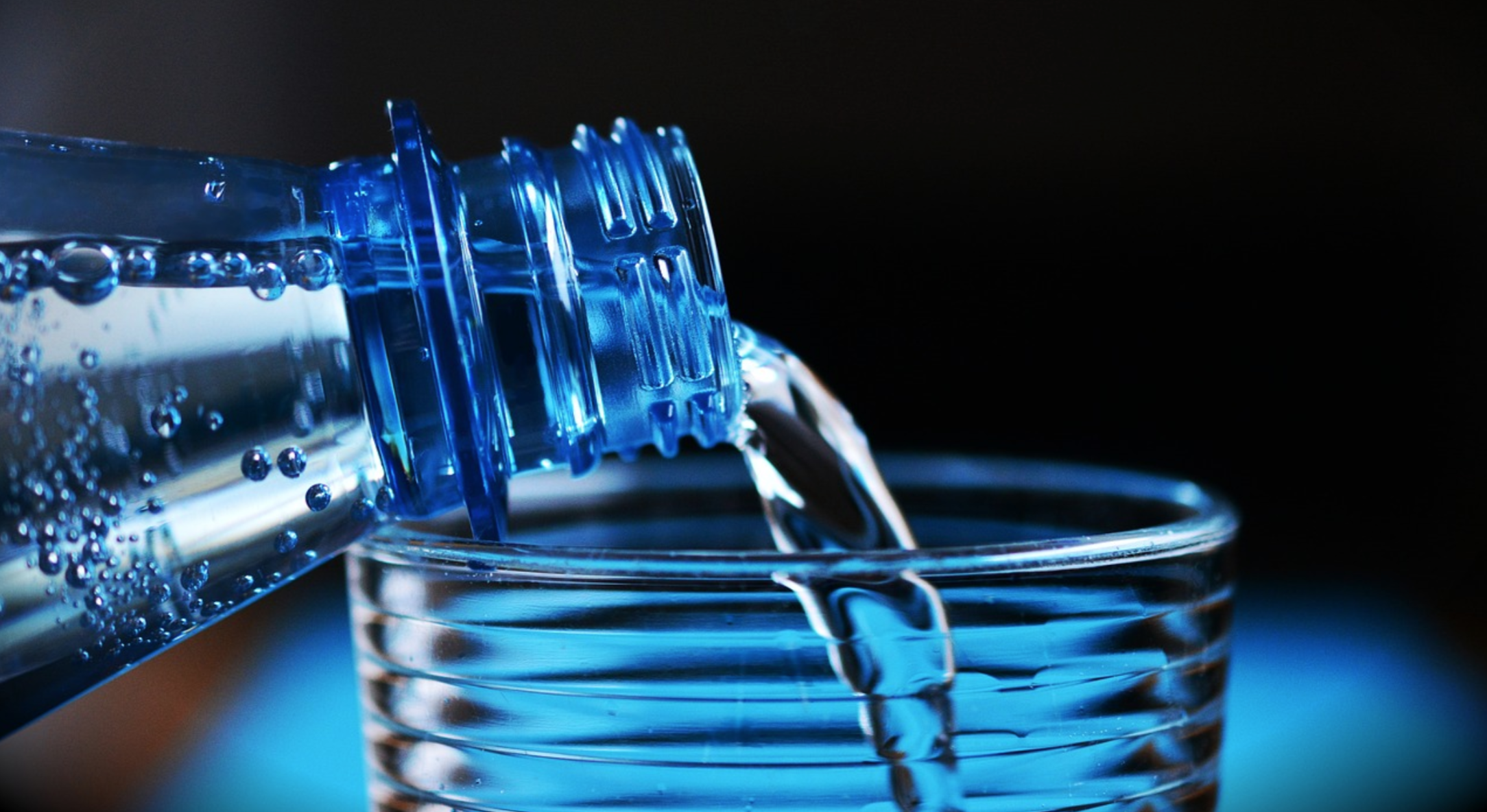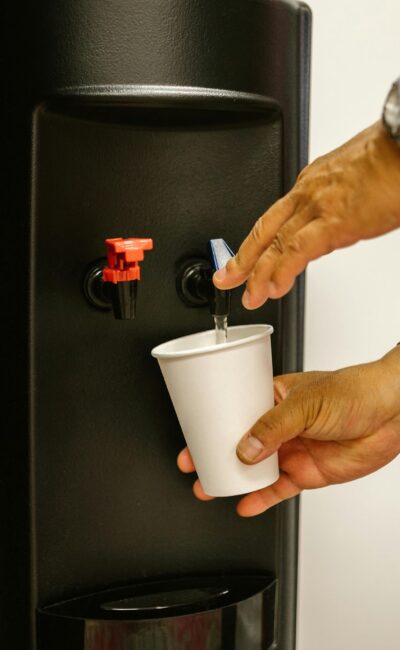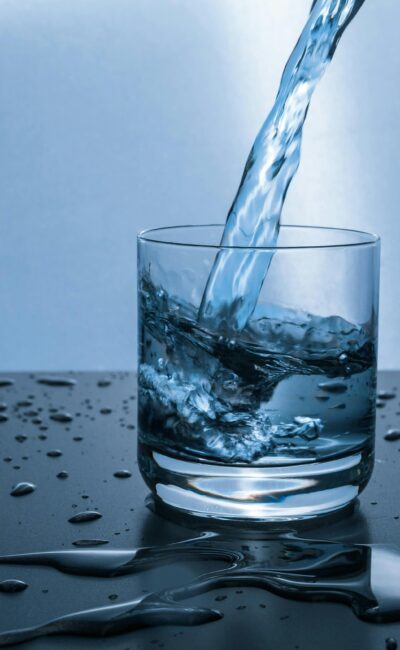We couldn’t survive without water. In fact, our bodies are 70% water and we rely on this precious liquid to stay healthy and strong. Water aids in digestion, flushes bacteria and waste from the body, carries nutrients and oxygen to the cells, and maintains our electrolyte balance. However, we lose a great deal of water through sweat and urine. For this reason, doctors and nutritionists stress the importance of staying hydrated.
However, water doesn’t have to be a boring liquid that is colorless and tasteless. It doesn’t have to be something we just rely on for survival. It can be something we enjoy. The market is full of different types of water that have different origins, consistencies, and compositions. They may also go through various drinking water purification methods. Be prepared to never look at water the same way again as we explore the world of drinking water options.
Tap Water
When you think of drinking water, tap water is often one of the first options that come to mind. This is the water that comes directly from your faucet. It can come from groundwater like a well or surface water like a river or stream. For public safety, this water should undergo the water purification process before it flows from the main supply to your thirsty mouth.
Tap water that comes from a public water system (a water provider that serves at least 25 people) must meet specific requirements within the Safe Drinking Water Act (SDWA). This federal law gives the United States Environmental Protection Agency (EPA) the right to set and enforce contaminant standards for drinking water. Tap water from a public water system must also meet the regulations set forth by state and municipal bodies.
However, even with these regulations, 25% of tap water fails to meet EPA standards. This means this water contains unacceptable levels of natural and man-made contaminants.
What is The Purpose of Tap Water?
Tap water has many purposes. You can use it for drinking and cooking, as well as for washing, household chores, and gardening. Basically, you can think of it as your all-purpose water.
Mineral Water
As its name suggests, mineral water is rich in minerals. This water comes from underground sources, which is why it naturally contains minerals like calcium and magnesium. These essential minerals have given mineral water a reputation as healthy drinking water. They also give this type of water it’s characteristic salty taste.
One important distinction of mineral water is that water suppliers can’t add additional minerals to the water. It also can’t undergo any treatment before packaging, except for carbonation or iron removal.
The mineral composition of this type of water can vary between brands. Some will have more minerals and others will have less. This is due to natural variations in mineral water sources.
What is The Purpose of Mineral Water?
Unlike tap water, mineral water tends to have just one purpose. It is meant for drinking. Many people find they enjoy its distinctive flavor. They also feel good about consuming the water because it naturally contains so many vital minerals.
Spring Water
Of all the drinking water sources, spring water is the most popular type. Sometimes, rainwater that accumulates underground comes to the surface as a puddle, which is also called a spring. These natural springs do not go through a community water system, however, water from these springs is safe to drink because it comes from underground.
Many proponents of spring water enjoy its natural and refreshing taste. They also like that the water is mostly clean free of most contaminants without undergoing modern purification techniques. They view spring water as a natural alternative to other water sources.
What is The Purpose of Spring Water?
In addition to drinking spring water, many people enjoy using it to brew coffee or tea. Most fans of spring water will use it for cooking and drinking but rely on municipal water for bathing, gardening, and chores.
Purified Water
Purified water is a general term. It refers to any water that has been mechanically processed or filtered to cleanse and purify it. Depending on who you ask, purified water could simply refer to tap water because it has undergone multiple processes to remove impurities and contaminants and prevent water pollution. Others say that purified water is water that undergoes another step of purification after it comes from the water plant.
Under the stricter definition of purified water, it must go through an additional purification process to purify it and prevent contamination. Some examples include osmosis, deionization, and distillation. You can purchase purified water directly or install a water purifier at home.
Regardless of the definition, purified water can come from any source, including your tap, a spring or surface water. Purified water goes through so many additional steps that the process removes nearly all impurities and makes it clean and safe for you to drink it no matter where it comes from.
What is The Purpose of Purified Water?
Purified water can be used for drinking and cooking, as well as household tasks. When the water undergoes additional purification processes, it is also suitable for medical, laboratory and industrial uses.
Distilled Water
Distilled water is another name for demineralized water. Such water has undergone the distillation process to remove all minerals and salt. During this process, the water is boiled to separate the pure H2O from minerals and other contaminants.
The contaminants in water have much higher melting and boiling points than water. Boiling water will cause pure water to turn to steam. The person distilling the water can then capture and cool the vapor, which will become distilled water.
What is The Purpose of Distilled Water?
While distilled water is the purest form of water, it is generally not recommended for drinking. Doing so can lead to mineral deficiencies, as well as rapid chloride, magnesium, potassium, and sodium loss.
Instead of serving as drinking water, distilled water is often used in medical facilities and laboratories due to its exceptional purity.
Bottled Water
Everyone is familiar with bottled water. Bottled water can be mineral, sparkling or spring water. It can also come straight from the tap, as about 25% of bottled water in the United States does. This might come as a shock, but there is no rule that requires bottled water to come from some secluded spring.
To be bottled water, the water only needs to meet all applicable state and federal standards, be sealed in a sanitary container and be sold for humans to consume.
While the EPA regulates tap water, the United States Food and Drug Administration (FDA) regulates bottled water as a packaged food product. This means bottled water must adhere to extensive food safety, inspection and labeling requirements. The FDA safety regulations are just as stringent as the EPA regulations for tap water. On top of that, bottled water is also subject to state regulations.
Although some bottled water may contain added minerals for flavor, certain ingredients and additives may cause them to be classified as soft drinks.
What is The Purpose of Bottled Water?
Bottled water has one primary purpose, which is drinking. People seek it out because it is convenient and some view it as safer than tap water. Other people may select bottled water because they prefer the taste of a certain brand or they view it as being of higher quality.
In some cases, people may choose to keep a bottle of water in a first aid kit. In cases of emergency, bottled water can be an excellent way to wash out cuts and other wounds before bandaging them.
Alkaline Water
Alkaline water has a higher pH level than normal drinking water. The pH level measures how acidic or alkaline a substance is. This number ranges from 0 to 14, with 0 being very acidic and 14 being very alkaline. Standard drinking water has a neutral pH of 7, while alkaline usually has a pH of 8 or 9.
In addition to its pH level, alkaline water must also have alkaline minerals and negative oxidation-reduction potential (ORP). The more negative the ORP value, the greater the water’s ability to act as an antioxidant.
Naturally, alkaline water becomes that way by passing over rocks and picking up minerals. However, most alkaline water becomes that way through an intentional chemical process called electrolysis. This process uses an ionizer to increase the pH of regular water.
What is The Purpose of Alkaline Water?
Advocates of alkaline water believe that the higher pH level of alkaline water helps neutralize the acid in our bodies. There is evidence that drinking alkaline water can be helpful for people who have conditions such as acid reflux, diabetes, high blood pressure, and high cholesterol.
FloWater’s Purified Drinking Water
FloWater’s Purified Drinking Water takes water to the next level. Our technology takes ordinary tap water and transforms it with minerals and electrolytes into the world’s best water. The result is the best-tasting and most-purified water on the market, which we create without any plastic waste.
Using our 7x Advanced Purification system, we take your existing water source and remove up to 99% of impurities found in typical tap water. FloWater then improves the water even more by adding traces of essential minerals and electrolytes. Finally, we run the water through a coconut carbon filter for a fresh and delicious taste.
We divide our purification process into three phases. The first phase is purification, which in itself, includes three different types of filtration: sediment filtration, carbon filtration, and osmosis filtration. Sediment filtration removes dirt, dust, and rust by catching any solid impurities that might exist in your tap water or pipes. Carbon Filtration removes smaller particles, such as chlorine, radon, hydrogen sulfide, and heavy metals. By removing these particles any odor or unpleasant taste is removed from the water. The last step in the purification phase is advanced osmosis. Osmosis filtration uses a semi-permeable membrane to remove any remaining contaminants like fluoride, bacteria, lead, pesticides, heavy metals, and herbicides.
The second phase of FloWater’s purification process involves improving the water with essential minerals and electrolytes. Activated oxygen is added to purify and sanitize the tank and internal system, alkaline to raise the pH level of the water and neutralize acidity in your body, and electrolytes to keep you hydrated and energized.
Finally, we finish with a coconut carbon filter made of coconut husks. Not only does this give FloWater a great taste, but coconut husks are highly efficient at absorbing tiny particles of contaminants, as well as removing odors.
What are The Benefits of FloWater?
One of the biggest benefits of FloWater is its purity. While 25% of tap water fails to meet EPA standards for water contaminants, FloWater removes 99% of contaminants. FloWater’s purification process also adds beneficial minerals like calcium, iron, magnesium, manganese, potassium, and sodium.
The taste of FloWater also sets us apart. 9 out of 10 people prefer the taste of FloWater to tap water, while 8 out of 10 prefer it to premium bottled water. When people enjoy the taste of water, they’re more likely to drink it. Our 20 indicators of health and wellness show this is true.
FloWater received top scores for improving physical health and mental wellness, as compared to water coolers and bottled water. At the same time, it gets high marks in the environmental health category by reducing plastic waste, saving natural resources, reducing garbage and having no negative effect on wildlife.
Our team is striving to change the way the world drinks water, and FloWater is making this a reality for our customers. Contact us to learn how FloWater can benefit your business by providing purified alkaline water.
Sources:
https://drinkflowater.com/the-water/
https://www.epa.gov/dwstandardsregulations
https://www.drinkmorewater.com/distilled-or-purified-water
https://www.healthline.com/health/food-nutrition/alkaline-water-benefits-risks
https://www.healthline.com/nutrition/purified-vs-distilled-vs-regular-water#section1
https://geology.com/articles/bottled-water.shtml
https://www.bottledwater.org/content/what-bottled-water





